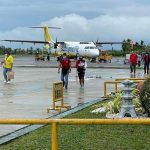
DA: 5 provinces have avian flu cases
FIVE more provinces have already confirmed cases of the Avian Influenza (AI) H5N1 which prompted the Department of Agriculture (DA) to order stricter and containment measures to prevent the virus from spreading all over the country.
DA-Bureau of Animal Industry (BAI) Director Reildrin confirmed that there are already cases of bird flu virus in the provinces of Nueva Ecija, Bataan, Tarlac, Sultan Kudarat, and Benguet.
Reildrin disclosed that the possible sources of infection and spread of the virus in said areas are the presence of migratory or resident wild birds, late or non-reporting of suspect cases (sick/dying birds), and illegal movement of infected birds from H5N1 infected areas as per disease investigation conducted by veterinary authorities.
It will be recalled that on March 8, DA Secretary William Dar has ordered a 30-day temporary suspension on the movement of all species of live birds – poultry and non-poultry including day-old chicks, day-old pullets, hatching eggs, ready to lay pullets, ducks, and quails from the mainland Luzon to Region IV-B, Visayas, and Mindanao in view of the outbreak of the virus in said regions.
This was contained in DA Memorandum Circular No. 5 which prescribes the “Guidelines on the local movement of domestic and wild birds and poultry products and by-products during the Avian Influenza surveillance period.”
The policy regulates the movement of ducks, quails, chicken, and other poultry commodities in affected areas, particularly those coming from within the one-kilometer quarantine area.
Based on the record, the initial confirmation of bird flu outbreaks were reported from duck and quail farms in Bulacan, Pampanga, Laguna, and Camarines Sur.
“We need to act immediately to control avian influenza – which was initially detected in a duck farm in Bulacan and quail farms in Pampanga – so that we can prevent further spread and damage to our poultry industry,” said Dar.
Reildrin, on the other hand, stressed that farm owners must comply with the transport requirements in compliance with the prescribed surveillance period, diagnostic tests, and biosecurity protocol of the World Organisation for Animal Health (OIE), in order to mitigate animal and public health risks posed by the virus.
He added that the DA-BAI has been closely working with the local government units (LGUs), DA-Regional Field Offices (RFOs), and other poultry industry stakeholders to ensure biosecurity and disease control measures are implemented accordingly.
The avian influenza virus detected is of subtype H5N1, which is also a threat to human health.
Dar emphasized that there is a need to double the efforts in controlling and containing bird flu because of its possible threat to humans.
“We can accomplish this through cooperation – especially those who are engaged in poultry production,” Dar added.
The DA-BAI, in close coordination with the LGUs and the private sector, has been conducting surveillance in all affected areas, along with the Department of Health (DOH) that monitors the possible transmission of the H5N1 virus to people.
To date, DOH personnel has not detected any sign or symptom in all outbreak areas.
Reildrin, meanwhile further said that the DA further has issued Memorandum Circular No. 6 Series of 2022 that prescribes the “Guidelines on the movement of domestic and captured wild (ornamental) birds and poultry products and by-products during the avian influenza outbreak.”
He explained that the policy provides guidance to LGUs and poultry industry stakeholders on the prescribed movement of live birds, poultry products, and by-products from Luzon to Region 4-B or MIMAROPA, Visayas, and Mindanao.
Reildrin added that on the global scale, H5N1 is the predominant strain in almost all poultry outbreaks in 2021 and 2022.
Of the 38 countries that reported the detection of H5N1 since the last quarter of 2021, 31 still have active cases, including the US, Canada, South Korea, Japan, and most EU member countries.
“We made it possible to be avian flu-free in previous outbreaks, we could still do that again, but we need your help,” said Dar.
“Let me reiterate to our stakeholders, especially the LGUs and the poultry raisers – please report cases immediately. You are the first to know if there are suspected cases, as you are working on the ground. So, we depend and rely on you in this battle against avian flu,” he added.


















